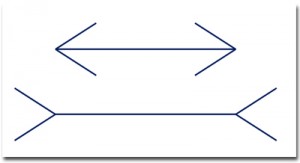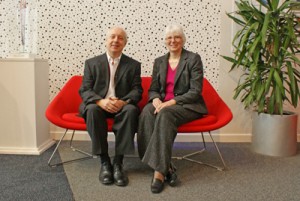6 March, 2013, by Francine Pickering
Thinking, Fast and Slow: The implications for business decisions
Speakers: Professor Stephen Diacon, Nottingham University Business School and Margaret Burrell, Contract Clarity
“Without a moment’s thought.”
You might be surprised to learn that very many of decisions – including important business decisions – are made in exactly this way.
Professor Steve Diacon focused on the insights from Daniel Kahneman’s recent bestselling book, Thinking, Fast and Slow, and how the way we think affects the day-to-day and more critical decisions we take in business.
Kahneman’s proposition is that we all have two “systems” to our thinking. The first (he calls it System 1) is instinctive, an instant response to a situation, and subject to illusions. It relies on short-cuts and heuristics. The second (System 2), is a more considered and deliberate way of thinking. It can counteract but not override the decision that System 1 has already arrived at. 
Consider the optical illusion we are all familiar with. We know from experience, perfectly well, that both the horizontal lines are the same length. System 2 tells us we already know this and have calculated it for ourselves in the past but System 1 still tells us that the one is shorter than the other.
So System 1 is intuitive and System 2 can be relied on to bring us back to rationality, yes? Not necessarily. System 2 can be a bit lazy, finding the rationalisation of the decision that System 1 has already come to rather than a truly rational alternative. It can also be subject to mistakes if it is overloaded. System 2’s capacity is finite and can be crowded out if you are carrying out other activities, even simply walking. An interesting argument against multi-tasking.
Steve highlighted three heuristics that System 1 might use as short-cuts to decisions.
Anchoring occurs when you set an expectation or understanding, for example by asking someone either, “Did Gandhi live to be older than 120?” or “Did Gandhi live to be older than 36?” If you then ask how old Gandhi was when he died, you’ll get different estimations, higher for the first question which anchored the respondent’s thinking at 120 and lower for the second which anchors it at 36.
What implications might that have for negotiating prices? Pretty powerful ones.
The availability heuristic is seen when someone relies on the information available to them – as Kahneman terms it, What You See Is All There Is – rather than the information they need to make a sound decision. As Margaret Burrell discussed in her presentation, this is a trap you do not want to fall into when reviewing commercial contracts. It is all too easy to look solely at what you think you need to see (for example, how quickly can we sign and get started on a project?) rather than at the wider and longer-term implications of the contract.
The hindsight heuristic is one we can all relate too – who hasn’t decided after the event that so much about it was predictable, despite having failed to predict it beforehand? In business we can too easily tend to evaluate a decision on its outcomes, neglecting the quality of the decision-making that went into it, and ignoring the part played by random factor.
So how do we keep Systems 1 and 2 under control, working effectively for us rather than to our own detriment? There was some discussion about whether one is “superior” to the other but the fact is we all use both types of thinking and each has its own place in our decision making.
Sometimes a quick, instinctive decision is fine, although the better honed the instinct the less likely to let us down System 1 will be. System 2, on the other hand, needs to be harnessed without its lazy inclination to back up System 1 regardless of the quality of decision.
Kahneman proposes a useful tool – backed by both Steve and Margaret in their presentations, the pre-mortem.
We are all familiar with the post-mortem review after a project – which will undoubtedly fuel our hindsight heuristic – but more useful still is to conduct that exercise before the project has taken place. Imagine the position in a year’s time if your course of action has turned out to be a disaster. What could go wrong? And how could you prevent it? It’s an approach that is par for the course for Margaret, a contracts specialist, but something that’s rarely carried out in other contexts. What difference could that make to your next project if you have tamed both System 1 and 2 to your advantage and you have pre-empted your potential pitfalls?
“I’m now starting to understand why I make decisions the way I do.”
“Loved the lively Q&A session.”
“An interesting take on academic thinking in the business world.”
The Ingenuity Knowledge Exchange breakfasts are free and open to all business owners. The next event is on 18 April 2013 and brings the Intellectual Property Office to Nottingham with a presentation on managing your intellectual property, branding and trademarks. Book your free place online here.


[…] and reputation. It’s an extension of Margaret Burrell’s presentation on the subject at a recent UNIEI breakfast event […]
the brain as it is an analytical part of the human system would always try n come up with snap judgements while the voice of Conscience almost takes its time to give the verdict but is crystal clear in its statement .. the need is to listen to the soft whisper .. n act acoordingly..
In terms of Joy n alligning yourself with the Universe .. its always the Voice of Conscience that wins as it is the voice of the the guarding angel…